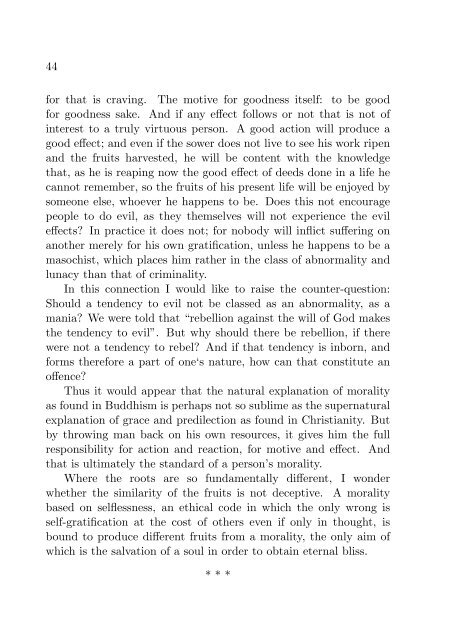Towards the Truth
Notes from a three-day debate in the 1940’s about Buddhism and Christianity.
Notes from a three-day debate in the 1940’s about Buddhism and Christianity.
You also want an ePaper? Increase the reach of your titles
YUMPU automatically turns print PDFs into web optimized ePapers that Google loves.
44<br />
for that is craving. The motive for goodness itself: to be good<br />
for goodness sake. And if any effect follows or not that is not of<br />
interest to a truly virtuous person. A good action will produce a<br />
good effect; and even if <strong>the</strong> sower does not live to see his work ripen<br />
and <strong>the</strong> fruits harvested, he will be content with <strong>the</strong> knowledge<br />
that, as he is reaping now <strong>the</strong> good effect of deeds done in a life he<br />
cannot remember, so <strong>the</strong> fruits of his present life will be enjoyed by<br />
someone else, whoever he happens to be. Does this not encourage<br />
people to do evil, as <strong>the</strong>y <strong>the</strong>mselves will not experience <strong>the</strong> evil<br />
effects? In practice it does not; for nobody will inflict suffering on<br />
ano<strong>the</strong>r merely for his own gratification, unless he happens to be a<br />
masochist, which places him ra<strong>the</strong>r in <strong>the</strong> class of abnormality and<br />
lunacy than that of criminality.<br />
In this connection I would like to raise <strong>the</strong> counter-question:<br />
Should a tendency to evil not be classed as an abnormality, as a<br />
mania? We were told that “rebellion against <strong>the</strong> will of God makes<br />
<strong>the</strong> tendency to evil”. But why should <strong>the</strong>re be rebellion, if <strong>the</strong>re<br />
were not a tendency to rebel? And if that tendency is inborn, and<br />
forms <strong>the</strong>refore a part of one‘s nature, how can that constitute an<br />
offence?<br />
Thus it would appear that <strong>the</strong> natural explanation of morality<br />
as found in Buddhism is perhaps not so sublime as <strong>the</strong> supernatural<br />
explanation of grace and predilection as found in Christianity. But<br />
by throwing man back on his own resources, it gives him <strong>the</strong> full<br />
responsibility for action and reaction, for motive and effect. And<br />
that is ultimately <strong>the</strong> standard of a person’s morality.<br />
Where <strong>the</strong> roots are so fundamentally different, I wonder<br />
whe<strong>the</strong>r <strong>the</strong> similarity of <strong>the</strong> fruits is not deceptive. A morality<br />
based on selflessness, an ethical code in which <strong>the</strong> only wrong is<br />
self-gratification at <strong>the</strong> cost of o<strong>the</strong>rs even if only in thought, is<br />
bound to produce different fruits from a morality, <strong>the</strong> only aim of<br />
which is <strong>the</strong> salvation of a soul in order to obtain eternal bliss.<br />
* * *
















